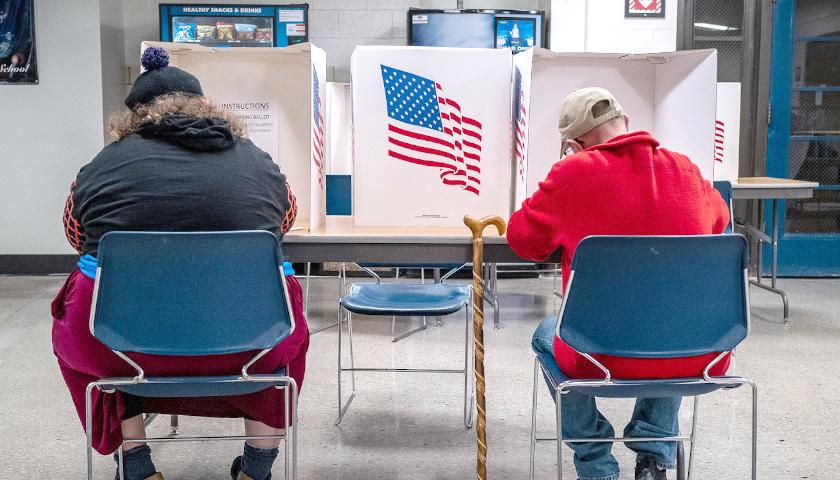by Aaron Kliegman
A George Soros-bankrolled prosecutor in St. Louis was fed derogatory information in early 2018 from two opponents of Eric Greitens — a special interest group executive and an estranged husband — before she filed and later withdrew criminal charges that toppled the sitting Republican governor of Missouri, according to documents turned over to Just the News under a court order.
Hidden from public view for years, the internal communications between St. Louis Circuit Attorney Kimberly Gardner and Greitens’ accusers provide new insights into the behavior of prosecutors and the external forces they worked with in a case that has resulted in legal misconduct findings against Gardner and a conviction for evidence tampering against her chief investigator, former FBI Agent William Tisaby.
Read the full trove of documents here.
Gardner, a Democrat whose campaigns in 2016 and 2020 received extensive funding from a Soros PAC, rocked Missouri’s political world in 2018 when she indicted Greitens. She alleged the then-governor had used a compromising cell phone photo to extort Katrina Sneed, the hairdresser with whom he had an extramarital affair. Greitens, a Republican who was married at the time, acknowledged the affair and was forced to resign, but denied the criminal charges.
Katrina Sneed later testified under questioning by Greitens’ attorneys that the allegation may have come from a dream she had.
Gardner abruptly reversed course later that year and dropped all charges before trial, admitting she never had material evidence of the photo or the extortion.
The new documents released to Just the News show that in an email with Gardner on Feb. 18, 2018, just four days before Greitens was indicted, Katrina Sneed raised concerns that the alleged photo didn’t exist.
“Scroll to the bottom of this article,” Katrina Sneed wrote Gardner. “It clearly quotes Eric’s attorney stating there was no photo right after the story came out.”
Read the document here.
Neither Sneed nor the St. Louis Circuit Attorney’s Office responded to requests for comment for this story.
The new documents were forced into public view after a three-year legal tussle by a lawsuit brought by Just the News Editor in Chief John Solomon under Missouri’s Sunshine Law. The memos show Gardner received derogatory information early in the investigation from:
- Jeff Smith, the head of a Missouri housing trade group that supported low-income housing tax credits that Greitens halted while governor.
- Al Watkins, the lawyer for Katrina Sneed’s estranged husband Philip Sneed, a radio talk show host in Missouri.
The records show that Watkins first approached prosecutors with evidence of the Greitens affair in January 2018, just a few days after his client, Philip Sneed, had received two $50,000 payments from Missouri Times newspaper publisher Scott Faughn and a man identified only in court records as “Skylar.”
The payments, identified in a Missouri Legislature report, have long been a mystery in the Greitens saga. Watkins has declined to discuss the payments in detail, citing attorney-client privilege, except to say they were meant to cover Philip Sneed’s attorney bills.
Watkins’ first contact in the new documents with Gardner’s office transmitted possible evidence of the affair in an email with the subject line “Potential Misconduct — Eric Greitens.”
“Attached hereto please find an attachment comprised of the following,” Watkins wrote, transmitting from Philip Sneed a few emails and contact information from his estranged wife showing she had a relationship with Greitens back in 2015 before he was running for office.
Read the document here.
The “evidence” included a “screen shot taken of Katrina Sneed’s phone reflecting the maintenance of Eric Greiten’s [sic] personal cell phone number in Katrina Sneed’s phone under a fictitious name,” Watkins’ email stated.
Watkins offered to make his client available to prosecutors. “There are other recordings between my client and his former spouse, however, it is understood these recordings do not contain information germane to the inquiry at hand,” Watkins wrote. “Please let me know the date and time you desire to speak with my client. I will do all I can to accommodate your schedule.”
Read the document here.
Watkins and Philip Sneed didn’t respond to requests for comment for this story.
While Philip Sneed, the estranged husband of the woman who had an affair with Greitens, was one force at work with prosecutors, a second was a disgraced former Missouri state senator named Jeff Smith, who pleaded guilty to two federal felonies in 2009 in a campaign finance case. In 2018, Smith was executive director of the Missouri Workforce Housing Association, a nonprofit that advocated for affordable housing and was a major booster of the state’s low-income housing tax credit.
As governor, Greitens halted the program, angering advocacy groups, real estate developers, contractors, and others that Smith’s group represents. Smith himself defended the program before Greitens’ action.
In February 2018, Smith forwarded to Gardner’s chief investigator, Tisaby, a list of names of potential witnesses against Greitens, including disaffected campaign staffers. The email was entitled “people you may want to speak with.”
Read the document here.
Less than a week later, the housing executive wrote a follow-up email “to offer a bit of context on some potentially fruitful lines of inquiry,” listing other people for Tisaby to speak with about Greitens and his staff over alleged campaign finance violations.
Read the document here.
Then in March, Smith sent Gardner’s office a more detailed dossier about the campaign finance allegations, including that Greitens improperly used a donor list from a veterans charity he founded for campaign fundraising purposes — an allegation that eventually made its way into a separate indictment.
Read the document here.
Two months after the Sneed indictment, Gardner charged Greitens for allegedly misusing the fundraising list. The charge was dropped a month later, shortly before the former Navy SEAL was forced to resign two years into his term amid public controversy over the cases brought by Gardner.
The Missouri Ethics Commission in 2020 fined the Greitens campaign $178,000 for two campaign finance violations while dismissing several other accusations. The commission said there were reasonable grounds to believe Greitens’ campaign broke Missouri law, but its investigation “found no evidence of any wrongdoing on part of Eric Greitens, individually, and no evidence Gov. Greitens knew” about any violations.
In 2018, however, Smith became such an important witness that by March of that year he received a subpoena to tell his story to the grand jury that would eventually indict the governor.
“Mr. Greitens — not me or others he has blamed — is responsible for the actions leading to his family’s dissolution and his political demise,” Smith told Just the News. “When the Circuit Attorney’s office learned that I’d known him since childhood, they subpoenaed me seeking information about his background. I didn’t want to repeat the terrible mistake I’d made a decade earlier, when I failed to fully and truthfully answer law enforcement’s questions [and went to prison for a year]. Thus, I did so to the best of my ability.”
Solomon, the editor in chief of Just the News, said the new documents fill in key details about Gardner’s legal pursuit of Greitens, including the political and personal forces seeking to damage Greitens.
“The Greitens prosecution has raised troubling questions about the weaponization of law enforcement to bring a case that was missing key evidence but still achieved a political outcome of forcing a duly elected official to resign,” Solomon said. “These documents show some of the external forces interacting with Gardner’s office at critical moments, contacts that the public would never have known about were it not for the Sunshine request we pursued.”
The Southeastern Legal Foundation, a nonprofit public interest law firm, helped represent Just the News in the litigation along with the Freedom Center of Missouri.
“For years Kim Gardner tried to hide these records from the public, directly disobeying the Sunshine Law and direct orders from the court to release them to the public,” said Kim Hermann, general counsel of the Southeastern Legal Foundation. “It is unconscionable that a prosecuting attorney who is responsible for knowing the law and applying it fairly and properly would so blatantly disregard and disobey it. As Mr. Solomon’s lawsuit proves, the truth will always come out.”
According to the Freedom Center, forcing Gardner’s hand was a victory for not just Solomon but also anyone seeking transparency and accountability from prosecutors.
“Under Kim Gardner’s leadership the St. Louis Circuit Attorney’s Office has developed a reputation for thumbing its nose at Missouri’s Sunshine Law,” explained Dave Roland, director of litigation for the center. “Mr. Solomon’s success in this case has blazed a trail for citizens to keep prosecuting attorneys transparent and accountable for the actions they take in the name of their constituents.”
Greitens told Just the News that the newly released memos verify his long-held concern that critics of his low-income housing bond reforms played a role in his prosecution.
“It’s more proof that the criminal conspiracy to lie about me was directed by Jefferson City insiders,” Greitens told Just the News, referring to Missouri’s capital city. “The Soros-funded prosecutor who attacked me turned these documents over — after lying about them for four years — after the U.S. Senate primary.” Greitens ran for the Senate this year, losing the Republican primary in August to Missouri Attorney General Eric Schmitt.
The new documents are likely to rekindle interest in the monies that exchanged hands at the beginning of Gardner’s criminal case and where they might have come from.
Watkins, the lawyer for Philip Sneed, has publicly acknowledged he received a $50,000 payment from Scott Faughn, publisher of the Missouri Times, in early January 2018 and the next day received another $50,000 payment from someone who went by the name Skylar, a possible courier.
Faughn told him that all $100,000 had come from “an unnamed, anonymous wealthy Republican who did not like Greitens and that it was personal,” Watkins said in a 2018 interview. “That’s all I knew about the guy.” He added there were “no conditions to this money.”
The cash exchanged hands a day or two before news of Greitens’s affair and alleged blackmail threat broke on Jan. 10.
Faughn, whose publication was critical of Greitens, had a different story. The money, he claimed, was his, and he was buying Philip Sneed’s recordings for a book he was writing about Greitens.
Other journalists, however, got the same recordings for free, and critics noted that Faughn and the Missouri Times had struggled financially so Faughn likely couldn’t make such a large payment.
In 2007, Faughn was convicted on three felony counts of forging checks in connection with his work leading the Poplar Bluff, Mo. Chamber of Commerce. In May 2018, the Missouri Capitol News Association, a group of media organizations that cover state government, voted to remove Faughn’s newspaper from its press corps after his payment to Watkins became public.
In court proceedings, Watkins refused to elaborate further on the payments, citing attorney-client privilege, claiming he and Faughn met before the first payment as part of an “attorney-client relationship.”
Specifically, “Faughn sought legal advice on matters including the payment of legal fees by a third-party, and Watkins provided legal advice to Faughn,” according to court documents.
The documents also showed Watkins said he understood the payments were delivered to him in connection with his representation of Sneed and were available for Sneed’s attorneys’ fees.
Read the documents here.
Sneed, a radio disc jockey, was asked about paying for his legal fees at an April 2018 deposition hearing and testified, “Yeah. Legal fees, and if — who knows, if something was given or whatever, this is going into a trust for my children.”
– – –
Aaron Kliegman is an enterprise reporter for Just the News, where he covers everything under the sun — from culture, to politics, to national security.
Photo “Eric Greitens” by Eric Greitens.

Sign up here to get your copy of The Star News Network Daily Update
Daily updates, breaking news, special offers, and more







